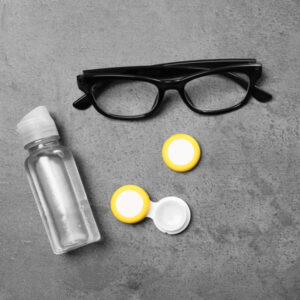 There is a lot of information and misinformation available about the coronavirus right now.
There is a lot of information and misinformation available about the coronavirus right now.
The most reliable source of information about Coronavirus is the Centers for Disease Control and Prevention (CDC). In case you haven’t heard, some of the actions recommended by the CDC are:
- Wash your hands often with soap and water for at least 20 seconds especially after you have been in a public place, or after blowing your nose, coughing or sneezing.
- If soap and water are not readily available, use a hand sanitizer that contains at least 60% alcohol. Cover all surfaces of your hands and rub them together until they feel dry.
- Avoid touching your eyes, nose, and mouth with unwashed hands.
Even Mike DeWine, the Governor of Ohio recommended making the switch from contact lenses to glasses via his twitter account @Govmikedewine. And, he smartly added that for those who must wear contact lenses, make sure to thoroughly wash your hands before touching your eyes.
The American Academy of Ophthalmology tells us that it’s important to guard your eyes, hands, and mouth. Coronavirus can spread through the eyes. When a sick person talks or coughs corona particles can spray from their mouth or nose to another person’s face. Their particles can enter your eyes, mouth, and nose. Additionally, you can become infected by touching something that has virus particles on its surface.
Coronavirus and Conjunctivitis (Pink Eye)
Although it’s rare, coronavirus may cause viral conjunctivitis or pink eye. Health officials believe that viral pink eye develops in about 1% to 3% of people with coronavirus.
The American Academy of Ophthalmology also recommends wearing glasses instead of contact lenses for now. Wearing glasses will lessen your need to touch your face. Additionally, substituting glasses for contact lenses will lessen the potential irritability of the eye and thereby lessen your chances of touching your face.
The Academy also says that glasses may add a layer of protection. Glasses can shield your eyes from catching droplets of an infected person. However, glasses still leave your face and eyes exposed from different angles. So, don’t fall into a false sense of overconfident protection. Neither a face mask nor glasses will completely protect you from catching the coronavirus. Safety glasses would provide more protection than glasses, but neither is full proof.
We also recommend that you wash your glasses regularly too in case they have shielded you from any droplets.
Avoid Rubbing Your Eyes
Another thing to avoid is eye rubbing. It’s very easy to rub your eyes without being conscious of it. Rubbing your eyes less will lessen your chance of contracting the coronavirus. If you do feel an urge to itch or rub your eye or adjust your glasses, use a tissue instead of your fingers. Dry eyes can cause you to be more tempted to rub your eyes.
Of course, as ophthalmology professionals, we know that not everyone can function in glasses. Some people don’t see nearly as well in glasses as they do in contact lenses. For example, patients with a corneal disease such as Keratoconus, often are very reliant on contact lenses. And, right now, even if you wanted to have LASIK or any type of corrective eye surgery, you’d likely have to wait until the quarantine is over.
If you are a person who is dependent on contact lenses, make sure that you exercise good contact lens hygiene.
Contact Lens Hygiene
Wash your hands with soap and water before you touch your contact lenses. Use a lint-free towel to dry them. Minimize your contact lenses’ exposure to water. That means, you should swim, shower, or hot tub with contact lenses in your eyes. You should also not use water to store contact lenses. You should also not use rewetting drops. People who put contact lenses in their mouth are also putting themselves at risk of contamination.
Listen to your optometrist when it comes to things like…
- how many hours you can safely wear your contact lenses in a day.
- when to get replacement contact lenses.
- how to rub and rinse contact lenses.
Pay Attention to Your Contact Lens Tools like Cases and Solution
Make sure you use fresh contact lens solution to rinse your contact lens case. Let the case dry naturally. Dispose of your contact lens case once every 3 months and replace it with a new one. If your lens case becomes cracked or damaged before it is 3 months old, throw it away, and replace it with a new one. Do not transfer the solution from the bottle you bought it into a different container. Make sure your contact lens solution bottle stays closed and does not come in contact with anything. If you leave your contact lenses in storage for 30 days, disinfect them before you put them back in your eyes.
Consider Ways to Become Less Dependent on Glasses and Contact Lenses in the Long Run
Most LASIK Centers aren’t performing surgery during the stay-at-home order issued on a statewide basis. But, when the order is lifted, ophthalmologists will once again offer refractive elective surgeries like LASIK, PRK, SMILE, and ICL procedures.
These procedures are all considered to be low risk and will help most patients become less dependent on contact lenses and glasses. Since there isn’t an immunization or a cure for Coronavirus, patients who are not dependent on glasses and contact lenses will have one less thing to concern themselves with regarding minimizing the risk of becoming infected.
To schedule a virtual consultation call us at (440) 740-0400













